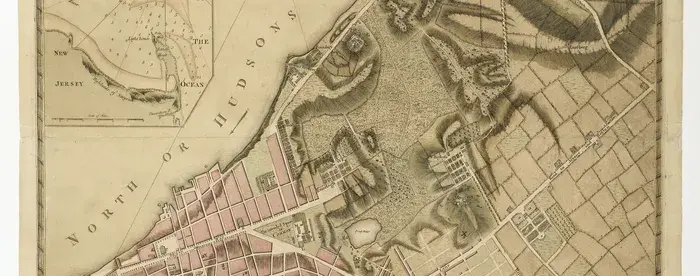Led by Prof. Catherine McNeur (Portland State University)
Course Number: AMHI 616
Semesters: Fall 2025, Spring 2024
Image: John Montrésor, A Plan of the City of New-York & Its Environs..., London, 1775 (The Gilder Lehrman Institute, GLC04315)
Led by Prof. Catherine McNeur (Portland State University)
Course Number: AMHI 616
Semesters: Fall 2025, Spring 2024
Image: John Montrésor, A Plan of the City of New-York & Its Environs..., London, 1775 (The Gilder Lehrman Institute, GLC04315)

This course is an introduction to the history of human interactions with the environment in the United States with a special focus on the history of political, social, cultural, and economic forces that have structured relationships with nature. Organized chronologically, the course covers topics that range from water and waste to food and fuel. We will address large questions about the underpinnings of Americans’ relationships with their environment by looking at a variety of case studies. By the end of the course, you will have a stronger understanding of not only how humans have dealt with environmental issues in the past but also the historical background for modern environmental issues.
Please note that the required books listed under course readings are finalized, but other aspects of the course syllabus are subject to change. We receive an affiliate commission from every purchase made through the Bookshop.org links provided. Thank you for supporting our programs!
Lecture 1: “(Mis)reading Indigenous Landscapes”
Catherine McNeur, Associate Professor of History, Portland State University
Catherine McNeur is the award-winning author of Taming Manhattan: Environmental Battles in the Antebellum City (2014). Her book Mischievous Creatures: The Forgotten Sisters Who Transformed Early American Science (2023) uncovers the lives of Margaretta Hare Morris and Elizabeth Carrington Morris, two unsung pioneers whose discoveries helped fuel the growth and professionalization of science in antebellum America. McNeur’s expertise is nineteenth-century American environmental history, but she teaches broadly in public history, the history of food, and urban history as well as United States history.
The views expressed in the course descriptions and lectures are those of the lead scholars.
Learn how the Institute impacts history education through our work guiding teachers, energizing students, and supporting research.